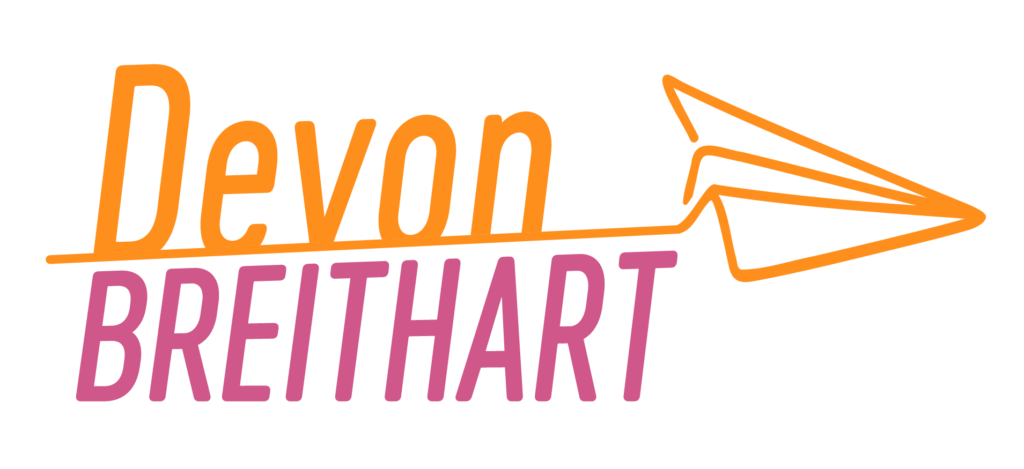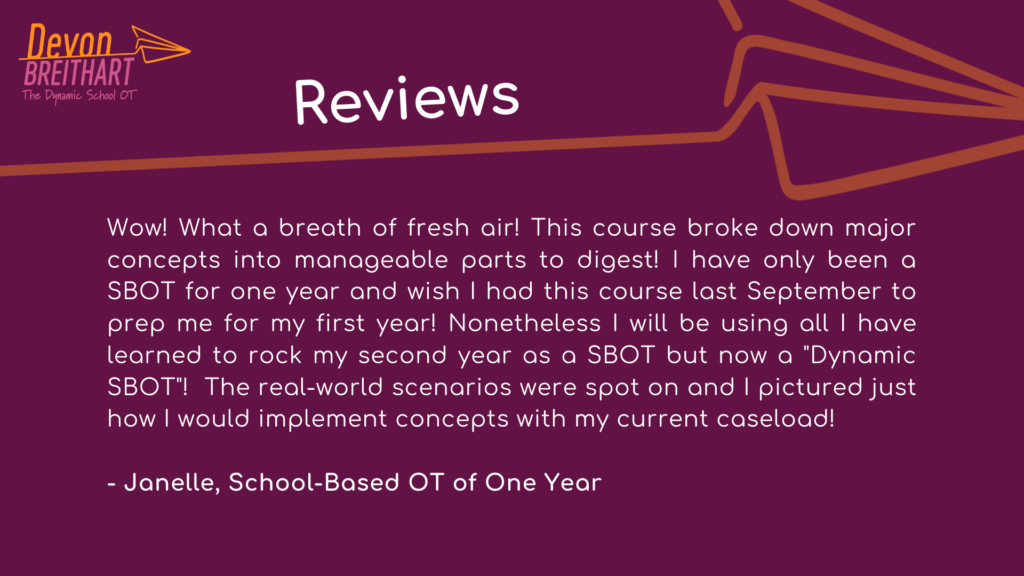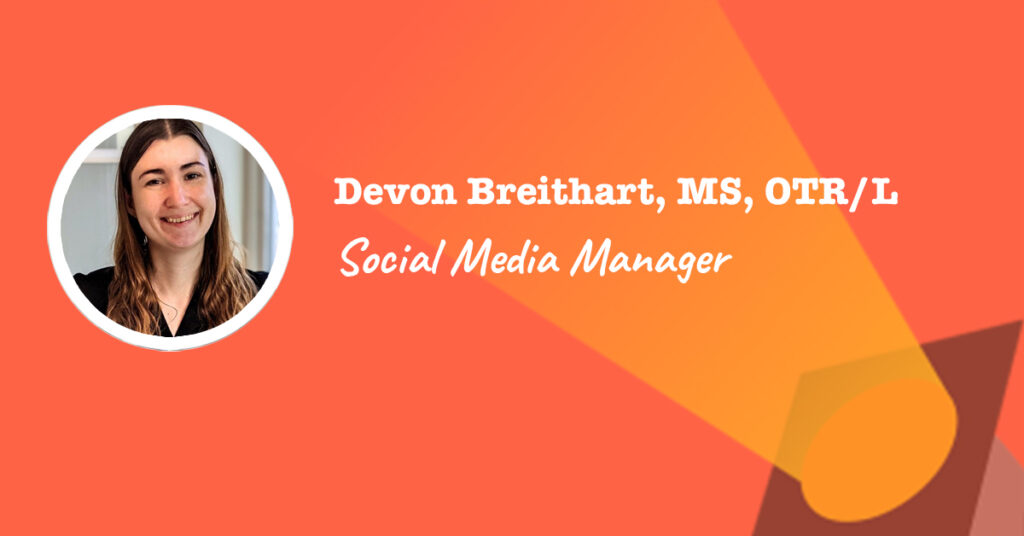This week, we’re spotlighting a non-clinical OT who works part-time as a school-based OT, and part-time as a social media manager, content writer, and marketer. She’s phenomenal, and I can’t wait to share her story with you!
This post may contain affiliate links or codes. This won’t increase your cost, but it helps keep TNCPT alive, and free of annoying ads! Thank you for your support. 🙂
What is your full name and title at your current job?
Name is easy: Devon Breithart, MS, OTR/L.
Title is a bit harder because I’ve never found a word that is descriptive, yet succint, that encompasses what I do.
“Consultant” is probably the shortest, but it’s also pretty vague. Some other titles that feel right are:
- Marketing manager
- Coach
- Course creator
- Copywriter
- Project manager…

Editor’s Note: Devon previously contracted as the Social Media Manager (SMM) for The Non-Clinical PT, but she really was so much more. She became a de facto project manager and marketing consultant because she just goes above and beyond. 🙂
Where are you located?
Currently, Seattle, WA. However, that always has the potential to change. I keep my hands in clinical practice by working as a travel OT in the schools.
Where did you go to OT school, and what year did you graduate?
I went to Spalding University, which is a small school in Louisville, Kentucky. I was lucky to do a combined B.S./M.S. program, so I got my Bachelor’s in 2014 and my Master’s in 2015.
What did you do when you first finished school, and for how long?
I was hired at an outpatient pediatrics clinic right out of school. I also briefly covered an adult home health contract while I was there, and later ended up working in early intervention and at a preschool for children with medical needs.
I spent some time doing PRN in SNFs during my first couple years as well. So, pretty close to a little bit of everything!
What did you do after that, and for how long?
After spending a little over two years working at that clinic, which was in the same town where I graduated, I knew I couldn’t keep suppressing my travel bug.
So, I dropped everything and moved across the country with my partner and our cat to start my work in the school system, which I’m still doing part-time today.
What did you enjoy about your early roles? What didn’t you enjoy?
I really loved the children and families I worked with. Seeing a family for an hour a week can build a relationship pretty quickly. You get closer than you’d expect. Patient care is such an intimate view into someone’s life, especially when it’s a family who is newly parenting a child with a disability. I’m still in touch with many of those families today.
The worst part of that job is definitely the way money intersects with American healthcare. From dealing with insurance companies denying claims, to getting paid way less than what I was told I would in grad school, I was pretty disillusioned at the end of my tenure there.
When did you realize you wanted to go non-clinical, and why?
I always feel like I fell into this sort of work, but looking back, maybe this was meant to happen.
One of my favorite high school teachers was disappointed to hear that I wouldn’t be majoring in English, but I wanted to go into a field where I felt like had more job security, earning potential, and an actual named career on the other side.
And, don’t get me wrong, I am still very, very happy to be an OT. But it is funny that my non-clinical work really has all of those features I was looking for in high school.
After practicing clinically for over a year, I was already feeling a little bored and stagnant, so I started picking up writing projects in my free time.
People always wonder how I did this, and while I don’t think it’s the only way or even the best way, I focused on building a reputation on Upwork.com. Pretty quickly, I was able to find OT-specific writing jobs that paid pretty well since there weren’t a lot of OTs on that site.
These early writing jobs ranged from things like blogs, test prep questions, and reviewing CEU courses.
Check out The Non-Clinical PT’s guide to getting started as a health content writer!

What are you doing these days?
These days, I continue to use my writing skills in a variety of ways. I built relationships with those early clients from Upwork and still work with a few of them even now. I also started getting work from other sources, including LinkedIn, Facebook, and word-of-mouth.
Last year, I started focusing on writing/content creation for social media, which eventually bloomed into supporting other therapy entrepreneurs running small businesses.
You tend to wear a lot of hats when working with a small business, which is why my work has expanded to things like project management, copywriting, supporting product/course launches, and general business consulting.
This year, I also started a new project, which I’m incredibly excited about. I’ve written a few small CEU courses for others in the past, but this year I released The Dynamic School OT, a course for school-based therapists looking to become more effective in their practice.

I know this feature is about non-clinical work, but I do want to say that I still really enjoy working in the school system, and I see myself always being involved in this setting to some extent. I just vibe with it in a way that feels different from all of the other settings I’ve worked. I’m still super passionate about it.
That’s the biggest factor that led me to creating the course—I want everyone else to feel that happiness and confidence in the schools.
Are you still treating patients, or are you solely non-clinical?
At this point, I’m working part-time in the schools, which is a nice change from the full-time I was doing at the beginning of the year.
If you’re still treating patients, about what percentage of your time is spent clinically vs. non-clinically?
I’m split about half and half between clinical and non-clinical work now.
How long have you been in your current role?
In total, I’ve been doing some sort of non-clinical work for close to five years now.
So, how do you handle finding jobs?
You know, I have updated my resume to include my non-clinical work. I don’t very often need to submit a resume for the type of non-clinical work I do, but I’m proud of it and I want to include it. I also updated my LinkedIn which I believe led to at least one contract.
While my work doesn’t involve interviews per se, I do have a process where potential clients can book a free discovery call before hiring me. This is kind of like an interview but also more like a conversation where we both see if we’re a good fit for each other. But I guess that’s what a good interview should feel like anyways, huh?
Did you get any special certifications or training along the way to help you get into your current role?
No certifications, but I have done some training along the way.
More than anything though, it’s experience that makes the difference. You have to write to be a good writer—that’s an inarguable truth. And read! I read so much as a kid. And, while adult Devon isn’t cranking out three novels a week like kid Devon was, I still spend a lot of time reading.
One of my favorite pieces of advice to give to anyone who is looking to write a specific type of content is to read how other people are approaching it. Looking to write an email marketing campaign? Sign up for someone else’s! See what you like, what sentences resonate with you, what feels too pushy, etc.
How have people reacted to you leaving patient care?
Most people think it’s pretty cool. I think there are a lot of other therapists who feel burned out or like they’re being underutilized in their current roles. I think this type of work appeals to a lot of those people.
At the same time, I know many therapists who would NOT be happy to be spending their time in front of a screen for most of the day.
What’s a typical day or week in the life like for you? What types of tasks and responsibilities fill your time?
I’m a big proponent of blocking your time. My Google calendar is pretty filled in every day, even if I’m working alone and not on any video calls. I tend to create time blocks where I’ll only focus on one client’s work. Otherwise, I log into Facebook and get overwhelmed by the volume of notifications.
I try not to do much, if any, non-clinical work on the days I’m working for the school district (though days start to blend together more now that I’m working from home for the district as well).
I do tend to keep a traditional workweek and take the weekends off.
Another soapbox I have is killing the 40-hour workweek, so I always try to work a bit less than that.
What are some of the challenges of your role? What are the rewards?
My current biggest challenge is not getting burned out on social media! I find that I typically do okay when working on it for a client, but I spend a lot less of my leisure time there (which is probably a good thing).
I do wonder how sustainable doing social media and marketing work full-time would be, which is one reason I’ve stopped actively pitching to clients. Instead, these days people mostly find me via word of mouth or just naturally connecting with me in online spaces.
Rewards: I really enjoy working with other therapy entrepreneurs. I don’t work with anyone whose work I don’t love and resonate with. It feels really good to support other small businesses who are doing work I value and want to see more of in the world!
Niche businesses in particular are my jam. In a way, it’s another method I can use to dip my toes into more therapy settings, even if it’s not in a clinical sense.
How do you think working as an OT prepared you to do what you do non-clinically?
I think OTs (and many other therapists as well) in particular make great writers and marketers. Psychology, a desire to help people, and working in patient care in general form a great base for marketing.
I know some therapists think marketing is evil and icky, but that’s not how I think of it. At the end of the day, all marketing is is a way to help people get connected with products or services that they need and will enrich their lives.
Roughly speaking, how are the hours and pay compared to patient care?
My current hourly rate for non-clinical work is $100 an hour, which is way more than I made in any permanent job and still more than I make with travel work. You do have to factor in higher self-employment taxes though. However, most of my non-clinical work is actually set up as retainers/packages. For example, I’ll agree to write x posts per week on x platforms for $x per month.
This past year, I’ve been trying to move past the time for money concept and start pricing my work based more on the value it provides to my clients. Which is a really hard thing to do, but so key to scaling a business and making sure it’s sustainable in the long run.
This year, I’m on track to making $40,000 before tax on non-clinical work which I feel is pretty good for a part-time business.
What type of person do you think would do well in your role?
Self-starters for sure. This isn’t non-clinical work that you can easily just go out and apply for, which I know is intimidating for some people.
I think the other things that make me successful in this role are that I’m detail-oriented, great at time management, and communicative.
I’m also not afraid to speak up when needed and take a stance when it’s important. Some people think this will lead to fewer clients, but it’s actually drawn more clients that share my values and are excited to work with me.
Do you work remotely or on-site?
I am fully remote at this point, both clinically and non-clinically! Though, I am always happy to meet up with a client if geography ever allows 🙂
Does your organization hire PT, OT, or SLP professionals into non-clinical roles? If so, what type of roles?
Not at this point, though if I ever step fully out of clinical work I would definitely consider hiring another therapist to grow my company!
Did you read any books, take any courses, or do anything special overall to get you where you are today?
Full disclosure: I read most of these books/did these trainings after already starting this work, and I think the experience of putting myself out there was the biggest key to my success. But here is a list of things I’ve found valuable over the past few years:
- Building a StoryBrand by Donald Miller* (Editor’s Note: that’s one of my fave business/design/marketing books, too!)
- The E-Myth Revisited: Why Most Small Businesses Don’t Work and What to Do About It by Michael E. Gerber*
- Business Bedrocks Group Coaching Program by Laura Park Figueroa
- Instagram with Intention by Hilary Rushford
*Please note that purchasing the books from the above links means The Non-Clinical PT makes a tiny commission, at no additional cost to you. Thank you for supporting our free content!
What is a typical career path for someone in your role?
Let’s find out! 😉
What is next for you? What do you want to do with your career long-term?
This year, I’m focusing on my own brand with The Dynamic School OT. I’m always developing more resources and improving the course.
I recently got AOTA approval, which I’m super jazzed about. I’m also considering offering a group coaching program that could either go along with the course or be open to alumni—stay tuned.
What would you recommend to someone who is considering going into a role like yours? Do you have any special words of wisdom for the readers?
Write write write, read read read, and stay plugged into communities that resonate with you. Find your niche 🙂
What would you like to change most in your profession, and why? How would you propose doing so?
Oh gosh. I feel like I could say a million different things, but I think the thing that would help the most is ending our healthcare system that prioritizes profits over people.
So much of what burns people out and draws them to non-clinical work in the first place is related to that, from productivity to low pay to unreasonable expectations.
Getting there is another story, but I believe it starts with voting for people who support universal healthcare and telling your loved ones why this is important to you.
If you could give yourself one piece of career advice you wish you had during your OT program, what would it be?
I think I’ve been asked this before and I feel like I drew a blank then too! I don’t know. I feel like I’m pretty happy with how things turned out in the long run.
I wouldn’t want to change anything that might lead me to being in a different spot today. I’m pretty content.
If you could teach anything to today’s graduate students in your profession, what would it be?
Probably something related to mindset, resiliency, and being a squeaky wheel when it’s called for 😉
Learn how to build, grow, and monetize a website with the course I created with Chanda of Pink Oatmeal!





